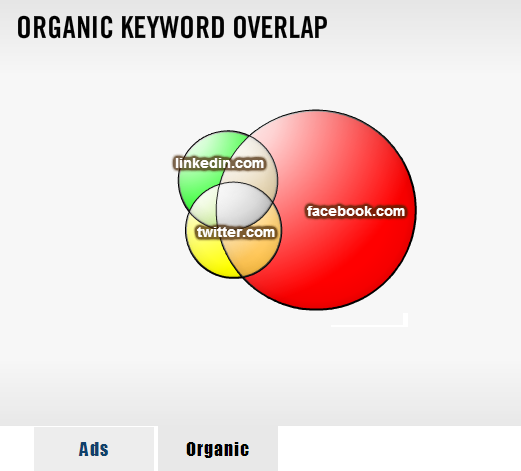If you have an interesting service or product, your competition for visitors, clicks and conversions is increasing as we speak.
In order to differentiate yourself from competitors and ensure your continued market dominance, you need to create a search strategy that’s based on multiple factors, including keyword trends, seasonality, localization, and consumer intent.
To keep ahead of the competition, you can start your keyword search by spying on your competitors a little bit. Find out what keywords they are ranking for, what keywords they use in their PPC campaigns, what keywords brings them traffic, and other valuable competitive data that will allow you to stay ahead of your rivals and create your own authentic keyword strategy.
There are many great tools out there that will do the “dirty work” of spying for you. Today, we’re going to analyze the capabilities of two of these tools and highlight how they can help you achieve your ultimate goal of staying ahead of the competition.
Competitive Keyword Research Tools
One of my favorite tools for competitive keyword research, SEMRush is very user friendly and intuitive. Categories are listed on the left side of the screen and organized separately for Organic Research, Advertising Research, Backlinks Intel, Keyword Research Capabilities, Facebook Integration, Tools, and SEMRush Ranks list with top domains from the Google database.
Domain Research
It’s really cool that SEMRush allows you to enter a domain and receive helpful insights about that domain’s organic keywords, as well as information about the competitors in organic search. This organic competition information includes competition level based on keywords, common competitor keywords, search engine keywords and traffic, estimated cost of purchasing the same number of visitors through ads and ads keywords. You can also access the top 200 organic keywords report for the analyzed domain and of course information about potential ads/traffic buyers. When these reports have been generated, you are going to discover some great competitive secrets in terms of organic search.
Advertising Research
On the other hand, the Advertising Research – Position subsection of SEMRush gives you the opportunity to discover some insightful data regarding your competitor’s paid keywords, ad position, cost per click, the number of visitors driven to the site from an ad, the number of search results per query, search trends for each query, and much more.
Competitor Research
The Competitors category lists down the competitors in ads, while the Ads Texts and Ads History (new features of SEMRush) sections show you the unique ad copy and the domain AdWords history, for any chosen domain. You’ll get also some nice reports on AdSense publishers and ad text from SEMRush.

 Just think how much this competitive data will help you as you can set up your campaigns based on your competitors’ best practices and results, including the keywords they used in their campaigns that turned out to be successful, effective ad placements, positions on SERPs, and much more.
Just think how much this competitive data will help you as you can set up your campaigns based on your competitors’ best practices and results, including the keywords they used in their campaigns that turned out to be successful, effective ad placements, positions on SERPs, and much more.
The Backlinks section allows you to check for backlinks data for details such as domain name, host name or URL.
Keyword Research
SEMRush also provides you with a Keyword Research Tool that will help you discover new, valuable keywords for your campaigns, giving you rich insights on the actual trends and ad history for your query.
Facebook Intelligence
Last but not least, one more thing worth mentioning about SEMRush is its recently added Facebook PPC Advertising Intelligence feature, which helps you discover Facebook ads relevant to a given domain. The data available include how many days they’ve been appearing, and geo targeting information, as well as advertisements and a list of the landing pages associated with the ads.
Facebook Advertising Intelligence offers also an “Ads by Keyword” report that shows the competitors advertising on Facebook for a given keyword.
Another great tool you can use to study your competition in detail is SpyFu. Just like SEMRush, Spy Fu provides you with rich insight reports for getting a handle on your competition and reveals how you can outrank them by studying their patterns of success, adapting their most profitable techniques, and making these techniques your own.
Basic Research
In the Classic Section of SpyFu, you can enter a domain or a keyword to view information like daily AdWords budget for that particular domain, the average ad position, number of advertisers, daily organic traffic value, and comparison between paid and organic clicks per day, as well as comprehensive reports on the best keywords for your query. These include keyword breakdown by month, top ad competitors, a list of organic keywords your competitors are using, and the top organic competitors for that set of keywords.
If your query is a keyword instead of a domain, you’ll get information on the cost per click, paid clicks per day, number of advertisers, and search volume for your query. On the same page as all of this data, SpyFu provides the advertising history for your chosen keyword, ad examples, and the top 50 Google results for your query.
In-depth Comparison
My favorite part of SpyFu is the Kombat Section, where you can enter up to three domains to compare their lists of paid and organic keywords. The results appear as circles in a Venn diagram, sized in proportion to each domain’s keyword list. The overlapping circles show where your keyword choices match those of the competition.
What’s really great about this feature is that it actually allows you to combine two tactics into one when comparing three domains, and the fact that it shows both paid and organic results. You can compare:
- Competitor vs. competitor vs. competitor to single out the most trusted keywords that your competitors feel the strongest about by clicking on the overlap between all three companies, or
- Competitor vs. competitor vs. you, which allows you to exclude common keywords from competitor matches, making it easier to return terms that trigger only your ads.
SmartSearch
Another must-try tool that SpyFu offers is the Keyword SmartSearch, which generates keyword lists filtered to your exact specifications.
Keyword SmartSearch looks at the domains that are buying the keywords you enter for search purposes and shows which keywords they’ve been consistently buying over time, essentially identifying those domains’ most profitable keywords.
SmartSearch is very easy to use and intuitive: just enter the keyword to get the domain that’s advertising for it; cost per day; number of advertisers; cost per click for broad, phrase and exact match; search volumes; click through rates; and much more.
You can filter and sort the report very rapidly by using the ‘Narrow Results’ option located on the left side of the chart. The main advantage SmartSearch offers is the ability to trust keywords that have already been tested extensively and use them to protect your budget. Additionally, every list can be immediately copied from SpyFu SmartSearch directly into Google AdWords and managed from there, integrating your competitive research into your regular management tasks.
History Lessons
Last but not least, SpyFu’s Ad History tool allows you to access to your competitors’ strongest keywords and ad copy. You already know that your ad copy should be eye-catching, actionable, and profitable, and the Ad History tool helps you achieve these goals easily. You only need to enter a keyword or domain in order to check out the top domains, review their ad copy, and observe their changes to the ads over time. That’s it. All the hard work has already been done for you, so you can learn from others’ successes.
So, it seems the secret is out: The competitive intelligence tools available on the market today help you not only gain a more comprehensive understanding of your competition, but also build the ideal strategy to turn relevant searchers into your future customers.
That’s all for now, folks. These are my favorite tools that I use on a daily basis for competitive research, both for organic and paid search. I don’t know what I’d do without them. My advice to you is to test them, analyze their capabilities, and take action. I bet you’ll be thrilled with the results.
I’m also curious to hear what other tools you guys use for competitive research, so feel free to share them here and let’s discuss them!









